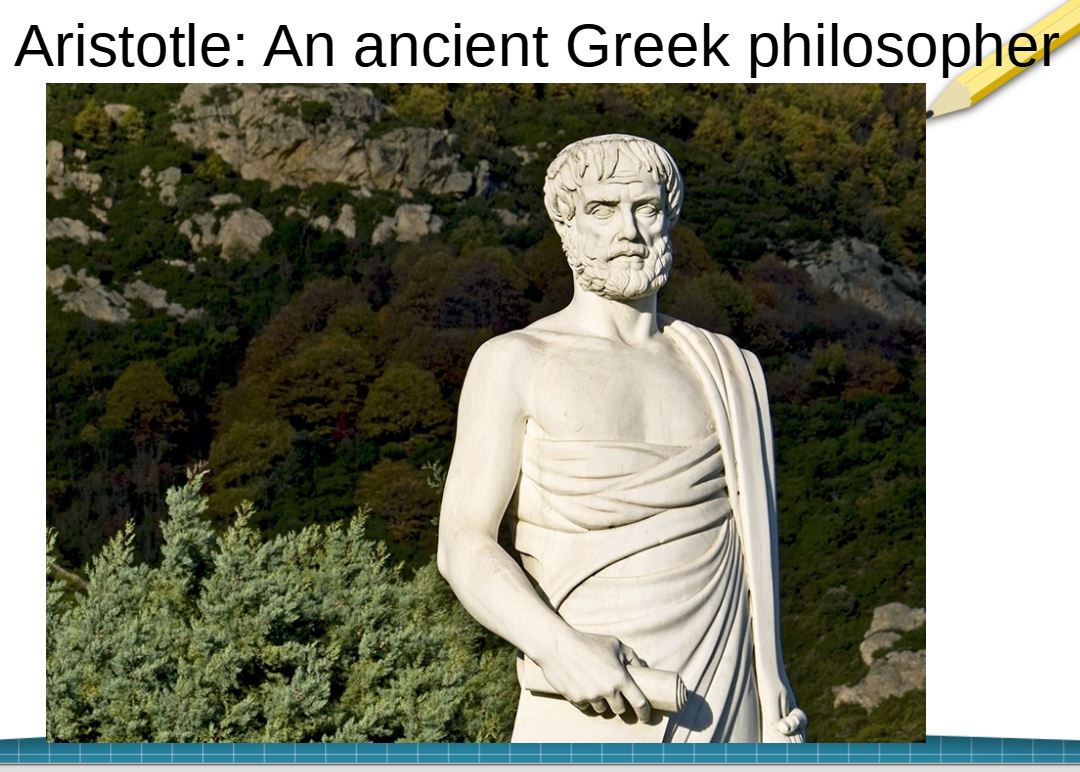Updated By: LatestGKGS Desk
Aristotle : about, Details, Early life, Achievement, History, works for Greece

Introduction of Aristotle an ancient greek philosopher
Aristotle, Greek Aristoteles, ancient Greek philosopher and scientist (born 384 BCE in Stagira, Chalcidice, Greece—died 322, Chalcis, Euboea), one of the greatest intellectual personalities in Western history. He developed a philosophical and scientific system that served as the foundation and vehicle for Christian Scholasticism and mediaeval Islamic philosophy. Aristotelian notions remained established in Western thinking even after the intellectual revolutions of the Renaissance, Reformation, and Enlightenment.
Early life
Aristotle was born in the year 384 BCE in Stagira, Greece, near the Macedonian border. Nichomachus, Aristotle's father, was the Macedonian king's court physician and died when Aristotle was ten years old. His uncle became the boy's guardian and oversaw his education. As the son and nephew of palace staff, Aristotle most likely spent time with the tutors at the Macedonian court, but this is not clear. Aristotle was sent to Plato's Academy in Athens when he was 18 years old to study for the next 20 years.
He was an outstanding student who graduated early and was offered a faculty post teaching rhetoric and conversation. After Plato's death, Aristotle appears to have expected to take over the Academy, but when that role was awarded to Plato's nephew Speusippus, Aristotle left Athens to conduct experiments and study on his own in the Greek Archipelago's islands.
Famous works and contribution
The Golden Mean (together with the Prime Mover) is one of Aristotle's most well-known contributions to philosophical thought, but it should be remembered that this was merely in the area of ethics; Aristotle contributed to every branch of knowledge available at the time. He famously investigated the distinction between voluntary and involuntary behaviours in ethics, pushing people to aim to fill their life with as many voluntary actions as possible in order to obtain the most satisfaction. He recognised that there were many duties and responsibilities that one would prefer avoid throughout a day, but he urged that one look at these perceived annoyances as possibilities and paths to happiness.
For example, someone who does not want to do the dishes may regard having to do so as an involuntary action. Cleaning the dishes, according to Aristotle, is a means to the desirable end of having a clean kitchen and clean plates for the next meal. The same may be said for a job that one dislikes. Instead than considering work as a hindrance to happiness, consider it as a method of purchasing groceries, clothing, travelling, and engaging in hobbies. In the twentieth and twenty-first centuries CE, a number of authors from various disciplines have emphasised the importance of positive thinking and thankfulness, but Aristotle was a far earlier proponent of the same viewpoint.
Aristotle addressed the question of memory-as-fact in his work On the Soul, suggesting that memories are impressions rather than accurate records of what happened. As one has new experiences, one's recollection of a terrible occurrence (say, a car accident) changes, and so does one's memory of meeting the love of one's life as a result of that vehicle accident. People choose what and how they recall things based on the emotional narratives they give themselves and others. This concept has been studied since the mid-twentieth century CE by Freud and Jung, but none of them came up with it first.
His Politics deals with state issues, which Aristotle saw as a natural development in any society of human beings. The state is a dynamic, living entity generated by individuals who live under its rules, rather than a static framework imposed on people. Aristotle addressed these questions long before Thomas Hobbes wrote his Leviathan on the burden of governance or Jean-Jacques Rousseau produced his Social Contract.
Aristotle's Poetics exposed literary criticism and the creative arts to concepts like mimesis (the replication of reality in art) and catharsis (the purging of powerful emotion). Throughout the European Renaissance, his judgments on poetic and rhetorical form would be taught as objective truths on the subject. Aristotle was inherently fascinated about all elements of the human condition and the natural world, and he studied any subject that came to his notice, learned it thoroughly, and then attempted to make it understandable and meaningful through philosophical interpretation. By formulating a hypothesis and then proving it through an experiment that could be repeated for the same results, he invented the Scientific Method in its earliest version.
Conclusion
When the tide of Athenian popular opinion shifted against Macedon after Alexander the Great's death in 323 BCE, Aristotle was accused of impiety because of his previous affiliation with Alexander and the Macedonian Court. Aristotle chose to escape Athens in the aftermath of Socrates' wrongful execution, "lest the Athenians offend twice against philosophy," as he put it. A year later, in 322 BCE, he died of natural causes.
For the past two thousand years, Aristotle's writings, like Plato's, have influenced practically every aspect of human knowledge. Although his works were not extensively read in the west after Rome's fall, they were admired in the east, where Muslim thinkers found inspiration and understanding in them. Aristotle's Ethics (written as a guide to good living for his son Nichomachus) is still used as a philosophical touchstone in the study of ethics. He made significant contributions to physics, founded the area and study of metaphysics, wrote extensively on natural science and political philosophy, and his Poetics is still considered a classic of literary criticism.
Throughout it all, he proved to be The Master, as Dante had suspected. Aristotle's work, like that of Plato, pervades the full spectrum of human knowledge as it is understood today. Many scholars, philosophers, and thinkers have debated, dismissed, ignored, questioned, and even debunked Aristotle's theories over the past two thousand years, but none have disputed that his influence was widespread and deep, establishing schools of thought and disciplines that are now taken for granted as having always existed.